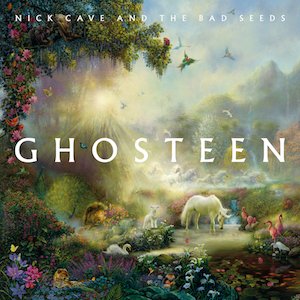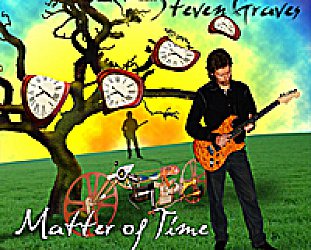Graham Reid | | 2 min read

Consider when people sang quietly along with Leonard Cohen when he performed Hallelujah, or even when Paul McCartney sings Here Comes the Sun in tribute to George Harrison.
The former song has an in-built spirituality to it, in the case of the latter it is that collective emotion attending to the absent Harrison which gives it a kind of spiritual bonding.
More unusual however is a crowd whispering “push, push the sky away” to Nick Cave or “into my arms, oh Lord” in that gorgeous love song which begins with the improbable line, “I don't believe in an interventionist God, but I know darling that you do . . .”
Cave's journey from the screaming Birthday Party through heroin gloom to his current status as an elegant senior statesman in beautiful bespoke suits and shoes has been something to behold.
It has been a journey many felt very attached to. So when his teenage son Arthur was killed in a fall in 2015, many felt it very deeply.
That he would deal with the loss and grief so openly in correspondence, conversation and the 2016 album Skeleton Tree (most of which was written before the boy's death) has only made him a more empathetic and sympathetic character in a popular culture where artists mostly claim victim status, and complain or brag.
The music of Nick Cave and the Bad Seeds has always – even when bellicose – been worthy of close attention, no more so than now for this hushed double album where the two parts are comprised of eight songs in the first half and in the second two long pieces (the 12-minute title track and 14-minute Hollywood) separated by a shorter spoken word piece Fireflies over a unsettling soundbed: “We are photons released from a dying star, we are fireflies a child has trapped in a jar”).
There is an emotionally muted quality at work here, supported by subtle orchestration (which avoids both romantic sentimentality and melodrama) and synthesiser beds by Cave and Warren Ellis.
The gatefold cover is interesting of itself: the front is deliberately a kitsch painting of some idyllic world where the lion lies down with the lamb, and the inner sleeve has Ellis and Cave out of focus and walking on a wind blasted beach. Two sides of life and dreams, perhaps.
If there are broad themes amidst the fine detail here (“I'm speaking about love now, how the lights of love go down, you're in the back room washing his clothes”) it is that there is beauty and loss in this existence, and that we have little comprehension of anything despite our most worthy efforts.
The subtext of these mostly understated, elegiac meditations on grief and spirituality is that even in the midst of life we are in death.
Love and reassurance is everywhere however, despite the highly personal and often menacing imagery.
There is an elegant arc here from the opening track Spinning Song where he has a long coda of “I love you, peace will come in time” to the closer Hollywood which ends on a similar thought: “Everybody's losing someone, it's a long way to find peace of mind, I'm just waiting for my time to come, I'm just waiting for peace to come, for peace to come . . .”
Alongside Leonard Cohen's beautiful Thanks for the Dance, Ghosteen is as moving a secular and spiritual album as you could expect to hear.
There is a considerable amount about all aspects of Nick Cave's career at Elsewhere including interviews and encounters alongside reviews. Start here.
You can hear Ghosteen at Spotify here.





post a comment